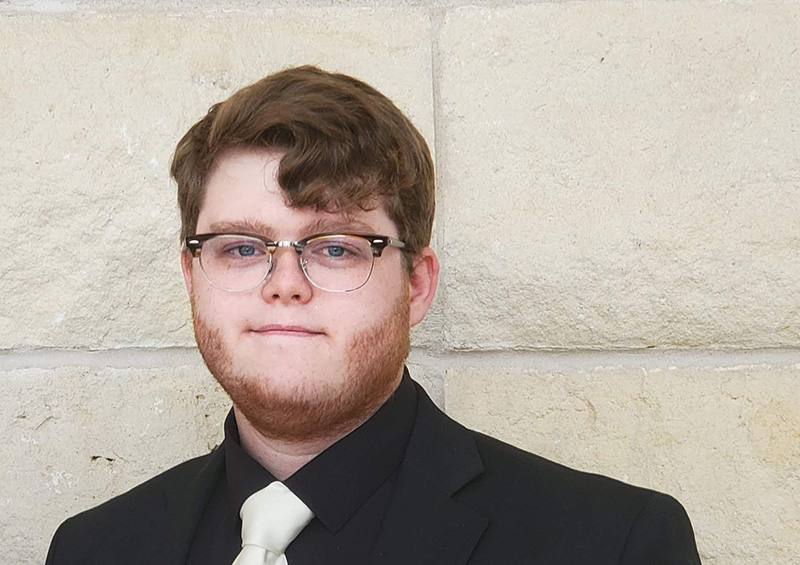 David Mills didn’t start reading music until he was a junior at Midland High School.
However, today, he relies on music to earn a living. He doesn’t play in a symphony
orchestra or have a band. Instead, Miller uses music to manage a range of psychological
and physical conditions and improve quality of life for those who served in the United
States military. He is a music therapist for the Department of Veteran Affairs at
a veterans’ community living center in Amarillo.
“The center is an assisted living center, so the patients whom I see are elderly,”
Mills explained. “Many are suffering from dementia and terminal illnesses, and I
use music to help maintain and improve their quality of life. When I play the guitar
and sing a song that they know, it helps them to remember things from their past.
It also relaxes them and lowers blood pressure.”
Mills said that he played the guitar off and on from the time he was 12 simply by
ear but was never very serious about it. At Midland High School, he played football
until his junior year when he quit football and joined the choir. His choir instructor
Jeff Fentem encouraged and helped him to read music for voice purposes, and in 2012,
he took some piano lessons. When he was 17, he sang as a tenor in the Midland-Odessa
Symphony & Chorale (now the West Texas Symphony).
“After high school graduation in 2014, I enrolled at Midland College but still never
considered music as a career,” Mills said. “However, then I took Music Appreciation
from Dr. Rabon Bewley, and that class was amazing! It really flamed my interest in
music. I remember talking to my Midland College math teacher Linda Penny about how
I really enjoyed music, and she suggested music therapy as a career. When I mentioned
it to my mother, she reinforced the idea. So, I did some research and discovered
that I could use my talent and interest in music to help others.”
Mills graduated from Midland College in 2017 with an Associate of Arts degree and
transferred to West Texas A&M University (WTAMU) in Canyon, Texas. He said that his
research led him to WTAMU because of their renowned music program, including music
therapy.
“It was at WTAMU that I really developed musical abilities,” Mills recalled. “I graduated
with a bachelor’s degree in music with an emphasis in music therapy with an instrumental
track. When I’m working with patients, I prefer to use the guitar and sing, but occasionally,
I play the piano and autoharp.”
After performing over 1,000 hours as an intern in San Angelo, TX, where he worked
with people of all ages with disabilities under the mentorship of a private therapist
Amy Rogers, Mills obtained national certification as a Music Therapist-Board Certified
(MT-BC). Prior to his current position with the Department of Veteran Affairs, Mills
worked at Northwest Behavioral Health Center in Amarillo, an acute psychiatric facility.
“When I discovered an opportunity to use music therapy to work with military veterans,
I jumped at the chance to be able to help this population,” Mills said. “There is
a myriad of benefits to music therapy services that bolster recovery, rehabilitation
and resilience with veteran populations across treatment domains, such as physiological,
neurological, psychological and social.
“I first visit with patients and find out what kind of music they enjoy. For most
of my current patients, it is ’50s Rock & Roll, old-school Country or Gospel. I usually
start by pulling up a song on my tablet computer so that they can hear the music with
the original voice recording. We listen to the song together and discuss the emotions
and memories the song elicits. Then, I will play and sing along and encourage them
to join. Sometimes, I’ll play a little bit of the song, and then they will want to
stop and talk about a memory that the song triggered. At other times, they just want
to close their eyes and listen.”
Mills said that while he currently works with senior citizens, music therapy is also
used with the very young, such as children who have an autism spectrum disorder for
whom the music and rhythm can help to regulate emotions. He explained that while
he was working at Northwest Behavioral Health Center, he has also used music therapy
for teens to reinforce playing instruments as a replacement behavior to self-harm,
such as cutting.
“Music is processed and produced through a different pathway than verbal speech,”
Mills explained. “Bypassing that verbal pathway allows patients to express themselves,
communicate with loved ones and experience the world more vibrantly.”
According to the American Music Therapy Association, using music therapy to help veterans
is not new. Modern music therapy was first used after World War II when community
musicians visited hospitals to perform for veterans. The soldiers seemed to improve
both physically and emotionally, eventually prompting the institutions to hire professionals
for the job.
“It is very rewarding at that moment when art and science come together to create
an awareness, an accomplishment, a breakthrough,” Mills said. “I’m fortunate to be
able to have that moment with those who have served our country.”
Mills and his wife Melissa have been married for almost five years. They first met
when they were attending Goddard Junior High in Midland and were friends throughout
their junior high and high school years. Romance blossomed when they were students
at WTAMU. Melissa has a degree in psychology and is working on a master’s degree
and credential as a Licensed Professional Counselor (LPC).
In his spare time, Mills enjoys, of course, playing the guitar, but his song genre
of choice when he isn’t working is Heavy Metal.
|
